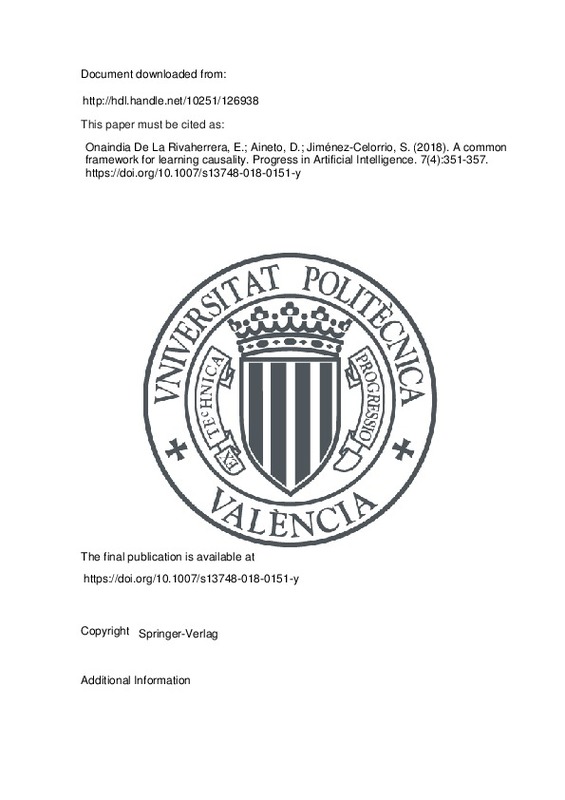Aineto, D., Jiménez, S., Onaindia, E.: Learning STRIPS action models with classical planning. In: International Conference on Automated Planning and Scheduling, ICAPS-18 (2018)
Amir, E., Chang, A.: Learning partially observable deterministic action models. J. Artif. Intell. Res. 33, 349–402 (2008)
Asai, M., Fukunaga, A.: Classical planning in deep latent space: bridging the subsymbolic–symbolic boundary. In: National Conference on Artificial Intelligence, AAAI-18 (2018)
[+]
Aineto, D., Jiménez, S., Onaindia, E.: Learning STRIPS action models with classical planning. In: International Conference on Automated Planning and Scheduling, ICAPS-18 (2018)
Amir, E., Chang, A.: Learning partially observable deterministic action models. J. Artif. Intell. Res. 33, 349–402 (2008)
Asai, M., Fukunaga, A.: Classical planning in deep latent space: bridging the subsymbolic–symbolic boundary. In: National Conference on Artificial Intelligence, AAAI-18 (2018)
Cresswell, S.N., McCluskey, T.L., West, M.M.: Acquiring planning domain models using LOCM. Knowl. Eng. Rev. 28(02), 195–213 (2013)
Ebert-Uphoff, I.: Two applications of causal discovery in climate science. In: Workshop Case Studies of Causal Discovery with Model Search (2013)
Ebert-Uphoff, I., Deng, Y.: Causal discovery from spatio-temporal data with applications to climate science. In: 13th International Conference on Machine Learning and Applications, ICMLA 2014, Detroit, MI, USA, 3–6 December 2014, pp. 606–613 (2014)
Giunchiglia, E., Lee, J., Lifschitz, V., McCain, N., Turner, H.: Nonmonotonic causal theories. Artif. Intell. 153(1–2), 49–104 (2004)
Halpern, J.Y., Pearl, J.: Causes and explanations: a structural-model approach. Part I: Causes. Br. J. Philos. Sci. 56(4), 843–887 (2005)
Heckerman, D., Meek, C., Cooper, G.: A Bayesian approach to causal discovery. In: Jain, L.C., Holmes, D.E. (eds.) Innovations in Machine Learning. Theory and Applications, Studies in Fuzziness and Soft Computing, chapter 1, pp. 1–28. Springer, Berlin (2006)
Li, J., Le, T.D., Liu, L., Liu, J., Jin, Z., Sun, B.-Y., Ma, S.: From observational studies to causal rule mining. ACM TIST 7(2), 14:1–14:27 (2016)
Malinsky, D., Danks, D.: Causal discovery algorithms: a practical guide. Philos. Compass 13, e12470 (2018)
McCain, N., Turner, H.: Causal theories of action and change. In: Proceedings of the Fourteenth National Conference on Artificial Intelligence and Ninth Innovative Applications of Artificial Intelligence Conference, AAAI 97, IAAI 97, 27–31 July 1997, Providence, Rhode Island, pp. 460–465 (1997)
McCarthy, J.: Epistemological problems of artificial intelligence. In: Proceedings of the 5th International Joint Conference on Artificial Intelligence, Cambridge, MA, USA, 22–25 August 1977, pp. 1038–1044 (1977)
McCarthy, J., Hayes, P.: Some philosophical problems from the standpoint of artificial intelligence. Mach. Intell. 4, 463–502 (1969)
Pearl, J.: Reasoning with cause and effect. AI Mag. 23(1), 95–112 (2002)
Pearl, J.: Causality: Models, Reasoning and Inference, 2nd edn. Cambridge University Press, Cambridge (2009)
Spirtes, C.G.P., Scheines, R.: Causation, Prediction and Search, 2nd edn. The MIT Press, Cambridge (2001)
Spirtes, P., Zhang, K.: Causal discovery and inference: concepts and recent methodological advances. Appl. Inform. 3, 3 (2016)
Thielscher, M.: Ramification and causality. Artif. Intell. 89(1–2), 317–364 (1997)
Triantafillou, S., Tsamardinos, I.: Constraint-based causal discovery from multiple interventions over overlapping variable sets. J. Mach. Learn. Res. 16, 2147–2205 (2015)
Yang, Q., Kangheng, W., Jiang, Y.: Learning action models from plan examples using weighted MAX-SAT. Artif. Intell. 171(2–3), 107–143 (2007)
Zhuo, H.H., Kambhampati, S: Action-model acquisition from noisy plan traces. In: International Joint Conference on Artificial Intelligence, IJCAI-13, pp. 2444–2450. AAAI Press (2013)
[-]







![[Cerrado]](/themes/UPV/images/candado.png)


